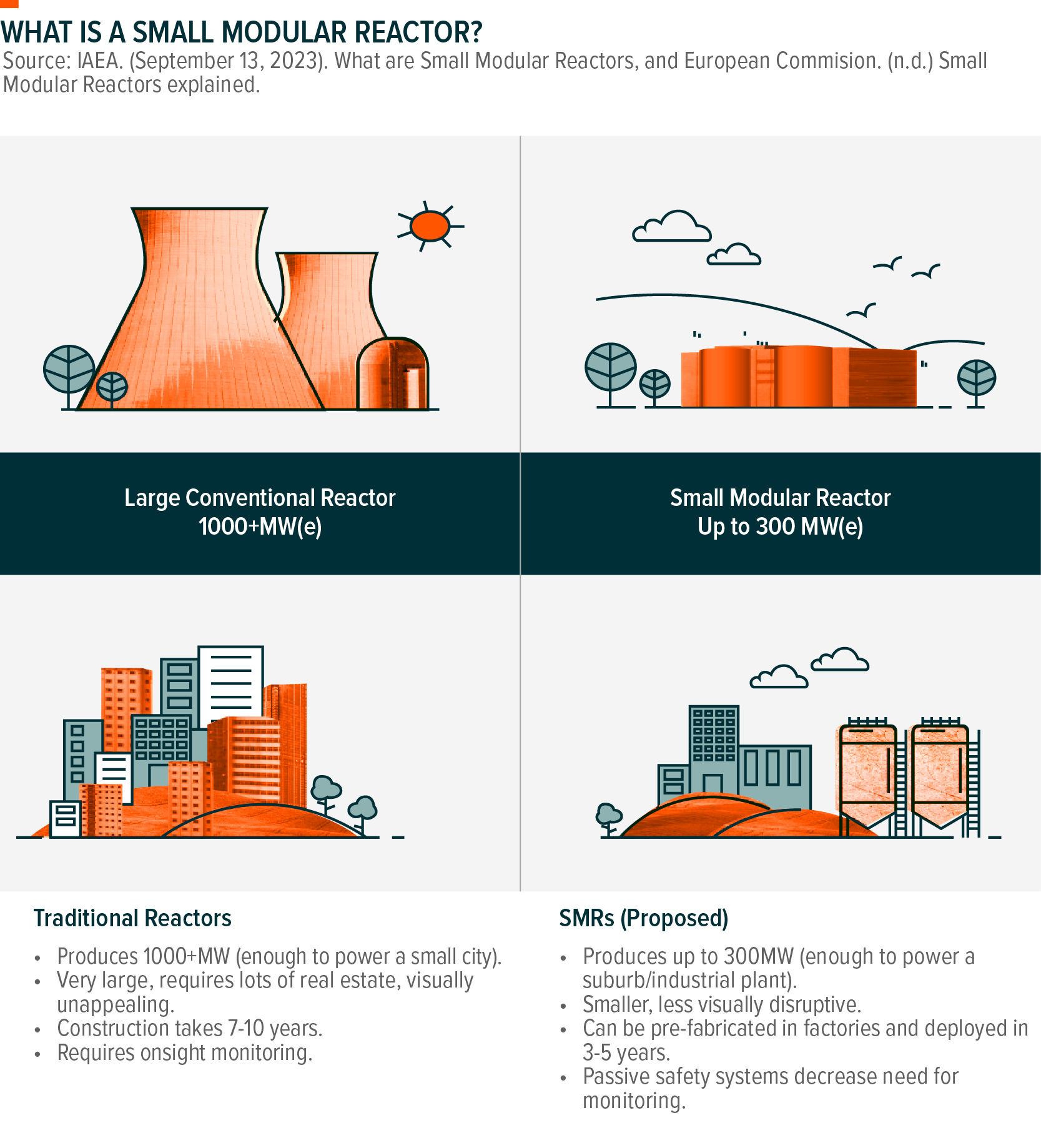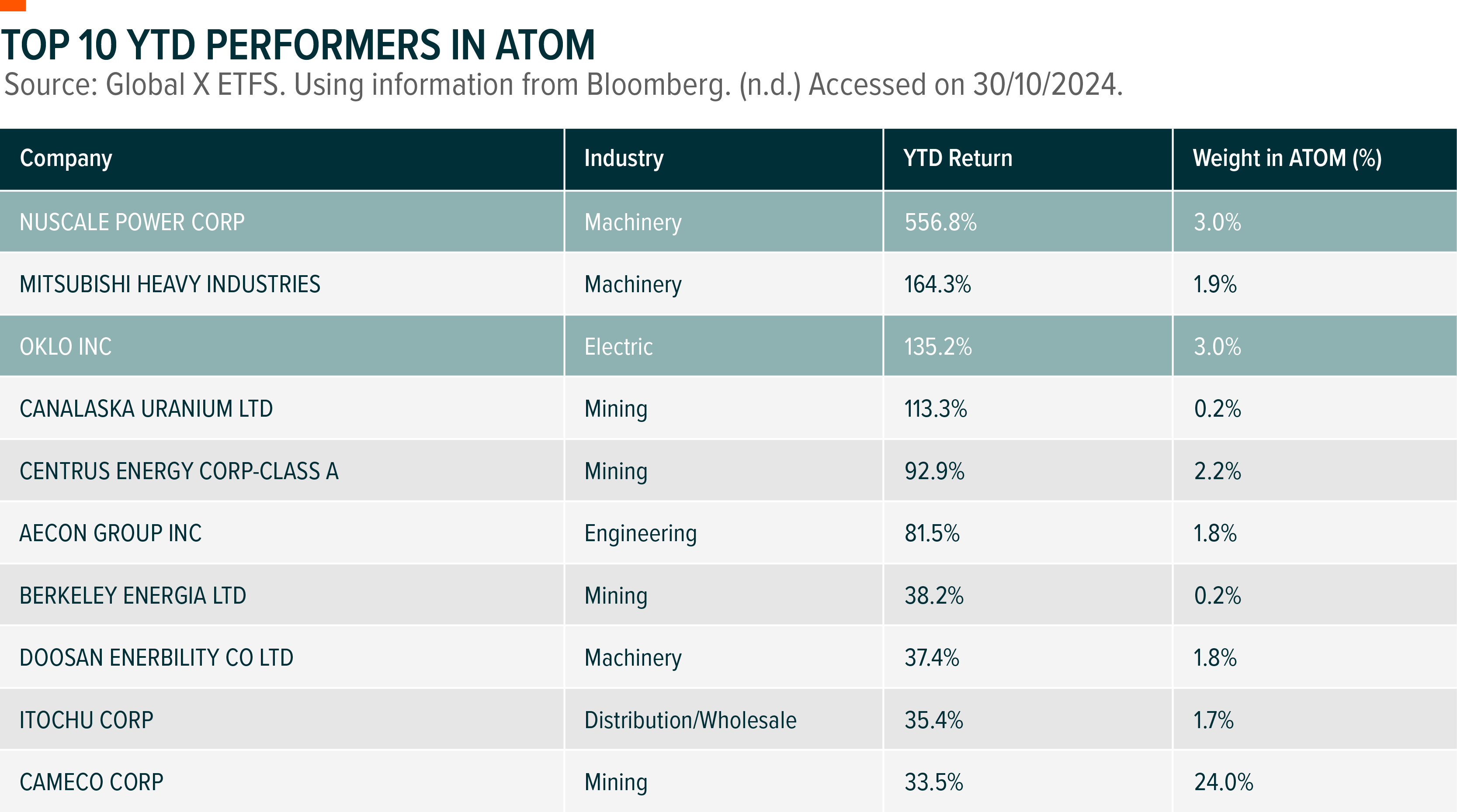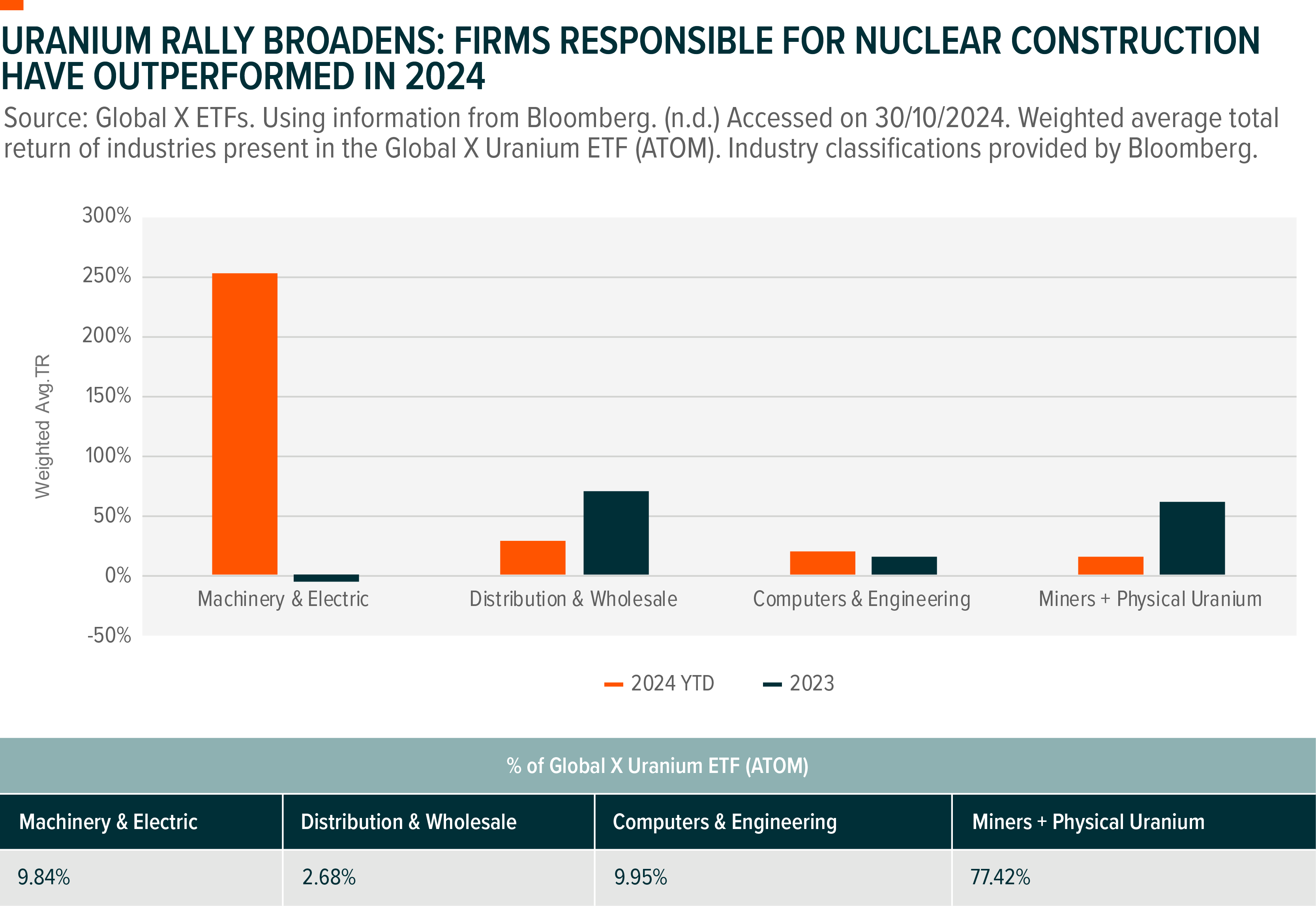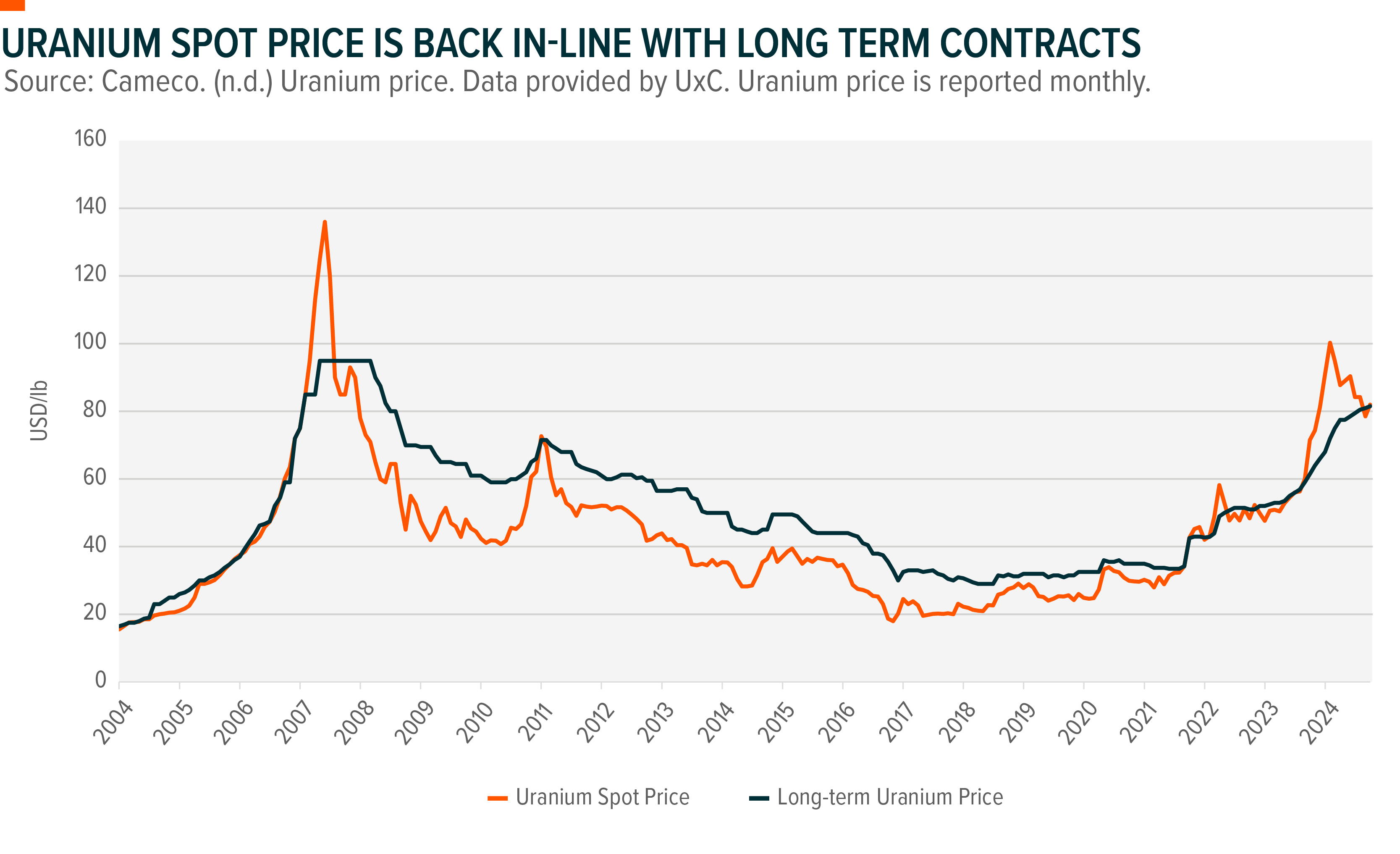The nuclear renaissance is more than a Uranium trade
After taking a healthy breather over Q3 2024, the nuclear theme is rising once again as a top performer. This quarter, we continue to see an influx of news which highlights the progress of nuclear adoption and signals a continued shift in global sentiment. However, with recent developments putting the spotlight on nuclear engineering and machinery firms, a new stage of the uranium thematic has been unlocked. Investor enthusiasm is no longer centred on physical uranium alone, as AI power demands and policy support for new technologies broaden the beneficiaries of our current nuclear renaissance.
Key takeaways
- Alphabet Inc.’s (Google’s parent company) recent investment in Small Modular Reactors (SMR) completes the pattern of nuclear adoption among the cloud hyperscaler “holy trinity” and puts the spotlight on new-gen nuclear technology.
- Government policy support is driving adoption across both the West and the East, with each side prioritising the buildout of domestic supply chains – highlighting companies related to nuclear construction and the nuclear fuel cycle.
- We believe having exposure to the full uranium value chain, including nuclear engineering, machinery, and construction firms, is critical to fully capturing the uranium thematic opportunity.
Big tech dreams of small reactors
On the 14th of October 2024, Google’s parent company Alphabet Inc. announced the world’s first corporate agreement to buy power from an SMR provider.(1) SMRs are a developing technology that promises to be smaller versions of traditional nuclear power. While SMRs are not yet a reality in the West (Russia and China claim to have already constructed functioning SMRs), engineering firms expect them to be safer, quicker to build, and take up much less real estate compared to their predecessors. Kairos Energy, the company contracted to build Google’s SMRs, intends to bring its first functional reactor online by 2030, followed by additional reactor deployments through 2035.(2)

Why invest in SMRs? With their safety, ease of construction and clean energy, SMRs make perfect partners for datacentres which have massive power demands and require near permanent uptime. Indeed, Google intends to use Kairos’ new SMRs to fuel the build out of a fleet of AI datacentres over the next decade.
Google’s new agreement with Kairos is just the most recent in a series of deals that big tech firms have inked with nuclear power providers in 2024. Earlier this year, Amazon purchased a nuclear-powered datacentre from clean energy provider Talen Energy for US$650 million.(3) Since then, Amazon has only doubled down, investing upwards of US$500 million across three corporate agreements (Energy Northwest, X-Energy, and Dominion Energy) to support the development of SMRs.(4) Microsoft, not one to be left behind, also recently signed a power deal with Constellation Energy to resurrect a nuclear unit on Three Mile Island in Pennsylvania, which has particular significance due to it being the site of the worst US nuclear accident in 1979.(5)
Microsoft (NASDAQ: MSFT), Amazon (NASDAQ: AMZN) and Google (NASDAQ: GOOGL) provide two-thirds of global cloud infrastructure, and with Google’s latest announcement, all three of the hyperscaler holy trinity are now aligned on nuclear power as a source of low-carbon energy.(6) Their enthusiasm toward SMRs has also rubbed off on investors, helping listed SMR developers such as Nuscale Power and Oklo Inc. dramatically outperform relative to both uranium miners and the rest of the market.

Governments turn around on Uranium
Governments across the globe have done an about-face on nuclear energy over the past two years. Many countries now reference nuclear power as an unnegotiable facilitator in the transition toward a truly carbon-zero energy mix. This October, for example, the European Nuclear Alliance, which includes countries such as France, Finland, Netherlands and Sweden, urged the European Commission to recognise the contributions of nuclear power in Europe’s progress toward decarbonisation.
However, given the current geopolitical climate, governments pushing for nuclear power have shied away from global supply chains, and have instead looked inward for the procurement of uranium fuel and build out of nuclear reactors. While this emergent theme is a negative for nuclear’s overall speed of adoption, it provides opportunities for investors as a wider range of participants find themselves benefited by government policy:
- Earlier this year the US Department of Energy requested proposals from US firms in a bid to purchase up to US$2.7 billion of uranium fuel from domestic sources.(7) This October, the US DoE awarded its first contracts, to a group of US uranium refiners to produce high-assay low-enriched uranium (HALEU).(8) American Centrifuge Operating, a subsidiary of Centrus Energy, was one of six companies selected for the contracts and rallied 56% on the week of announcement.
- In Japan, where the stance on nuclear has softened significantly, companies such as Mitsubishi Heavy Industries (MHI) have been key beneficiaries. As Japan considers maintaining and building new nuclear power plants, MHI is the likely contractor. MHI is an engineering company with unmatched expertise in the construction of nuclear reactors. As of 2023 the company had a 46% market share on large-scale nuclear turbine generators and its stock has rallied more than 150% this YTD on the Tokyo exchange.(9,10)

The Uranium trade broadens
As of the end of September, spot uranium prices have come back in-line with long-term uranium contracts. As such we view the current market pricing as a reasonable and potentially attractive entry-point for investors with conviction in the proliferation nuclear power.

However, physical uranium or uranium miners (which reflect physical prices), are not the only game in town. Evidently, exposure across the value chain – to nuclear engineering, construction, and industrial firms – is critical for investors who wish to capture the full momentum of the uranium thematic. Quantitatively, industrial and engineering firms are currently priced more attractively than uranium miners, despite being more likely to continue benefiting from policy tailwinds.

Related fund
The Global X Uranium ETF (ASX: ATOM) invests in a wide range of firms across the uranium value chain including miners, physical uranium, engineering, construction, and SMR designers.

1 topic
4 stocks mentioned
1 fund mentioned

